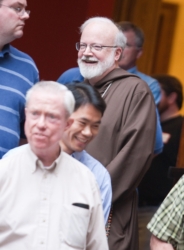From Cardinal Seán’s blog
On Wednesday, I attended the 5th anniversary of the Vianney Priests Gathering. Every year the numbers have increased. This year, the turnout was wonderful. Father George Evans gave a conference on the Cure d’ Ars, which was followed by vespers at which I preached.
Then, we had a cookout and, luckily, the weather cooperated. It was overcast and cool, but very pleasant.
This is the Year for Priests and events like this give us an opportunity to reflect on the importance of our priestly fraternity, renewing our commitment to serve God’s people and being members of his presbyterate. We must also deepen our interior life.
There will be many activities during the course of the year in order to promote priestly identity and spirituality including an international retreat for priests in Ars, France and a seminar here at the seminary on the meaning and importance of celibacy for the Church.
I am very grateful to Father William Kelly for his work on ongoing formation for priests.
Eunice Kennedy Shriver
(August 13) I went to Our Lady of Victory Church in Centerville and there presided over the reception of the body of Eunice Kennedy Shriver in an intimate ceremony with the pastor, Father Mark Hession, and the members of the Kennedy and Shriver families.
The parking lot was crowded with media trucks and people. The afternoon viewing afforded the opportunity for thousands of people to file through the church and pay their respects to this great Catholic woman. I was happy to be able to be a part of this simple prayer service in which her family placed the pall and crucifix on her coffin, prayed and reflected on the Scripture.
I was very pleased to be able to see Sargent Shriver after so many years. With his Alzheimer’s, it was difficult to know exactly how much he understood of the day’s events and I did not know if he would recognize me. It had been many years since I had last seen him, but I was very moved when he immediately kissed my ring.
I was touched by how solicitous the family was for him, especially Gov. Schwarzenegger, who is obviously a very devoted son-in-law.
Some of the Shriver children remembered the time I celebrated Mass for the Shrivers, Cesar Chavez and about 100 farm workers in their patio back in the 70s. The Shrivers were living in Maryland at the time and I was at the Centro Catolico in Washington. I joked with them, “I think we destroyed your garden!”
That work with the farm workers was just one more indication of the profound commitment of Eunice and Sargent Shriver to the social doctrine of the Church. She was preeminently prolife, against abortion and there to protect and underscore the dignity of every person. This, of course, manifested itself in her love for children with disabilities.
In that regard, she reminds me very much of Jean Vanier who founded the L’Arche movement in Canada. That movement was born out of the Church’s teachings on the dignity of every human person as a treasure made in the image and likeness of God and of our obligation to care for each other and to recognize the gift in each person.
Certainly, what Eunice Shriver did made a positive impact in so many ways and was a very strong witness of her Catholic faith.
Her sister, Rosemary, who was mentally retarded, opened up a whole reality that led Eunice to be such a pioneer and allowed her to make such a mark on history with the Special Olympics. It has been my experience that when a family has a child with a mental disability or Down Syndrome, the siblings often learn more about compassion and understanding than they would have if they did not have that exceptional child.
Rosemary was undoubtedly a great blessing in Eunice’s life who allowed her to discover, in faith and in love, the beauty of her sister. It was that relationship with Rosemary that was later extrapolated to all the children who experience similar types of challenges.
While Eunice’s works were remarkable, I don’t want to lose sight of the fact that her Catholic faith and education was a very important part of what motivated her and helped her to interpret reality, particularly the reality of disability and retardation (...) It was certainly the soil out of which grew her passion and dedication to the less fortunate and those who are challenged by disabilities and mental retardation.



















